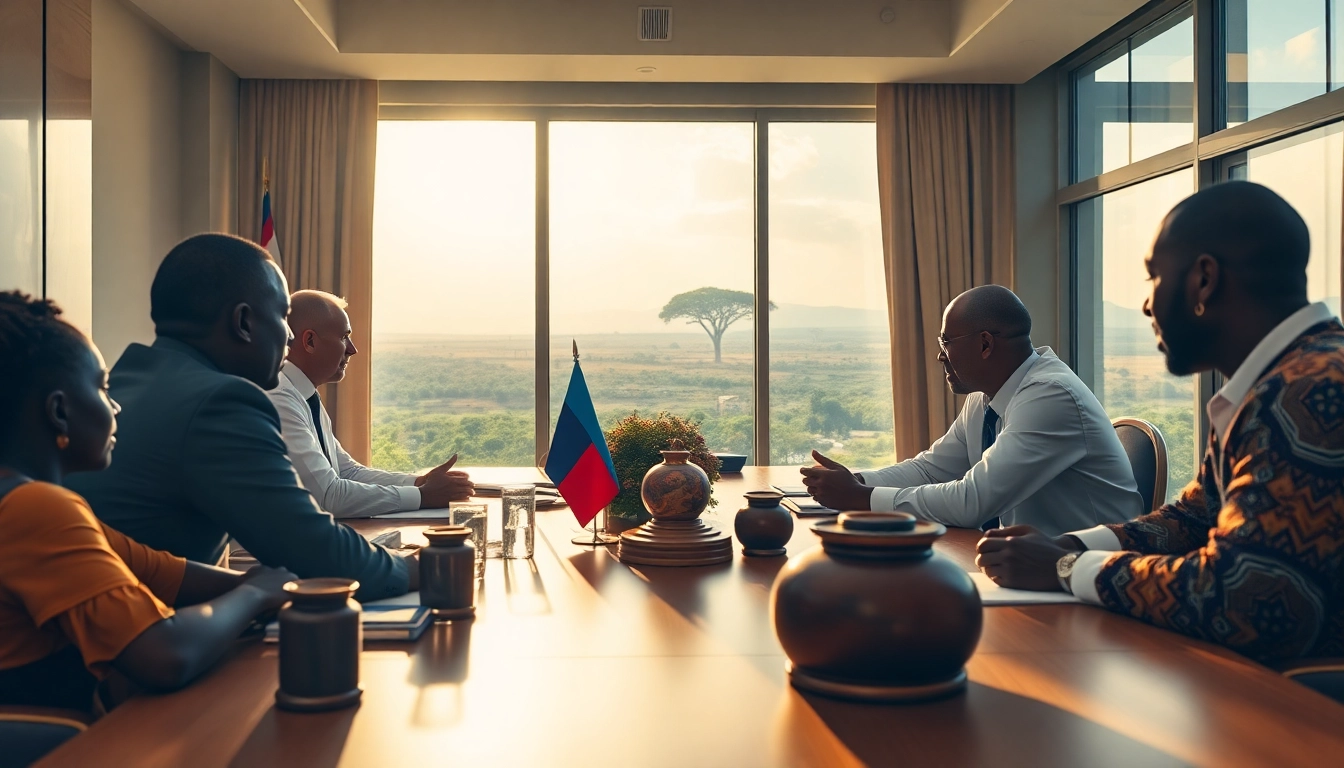Understanding Russian Influence in Africa: A Deep Dive into Geopolitical Dynamics and Economic Ties
Introduction to Russian Influence in Africa
The growing presence of Russia in Africa has become a pivotal subject in discussions surrounding international relations and geopolitics. As the continent embarks on a path towards economic empowerment and increased autonomy, Russian influence emerges as a double-edged sword. Many African nations, seeking new partnerships beyond traditional Western allies, are reevaluating their relationships with Russia, which offers alternatives in terms of military, economic, and political interaction. The Russian influence in Africa encompasses a mix of cooperation, strategic investments, and soft power initiatives that are reshaping the political landscape. This article delves into the historical context of these relations, current trends, and their implications for African sovereignty.
Historical Context of Relations
Russia’s engagement with Africa has roots that can be traced back to the Soviet era, characterized by ideological alliances during the Cold War. The USSR sought to challenge Western dominance by supporting liberation movements across Africa, providing military and political assistance to nations aspiring for independence. Prominent examples include support for the African National Congress (ANC) in South Africa and liberation movements in Angola, Mozambique, and Zimbabwe. This historical support laid the groundwork for a complex relationship that has evolved over the decades.
In the post-Cold War era, Russia’s influence waned as the continent embraced neoliberal economic reforms and attracted Western investment. However, the recent geopolitical landscape has seen a resurgence of Russian interest in Africa, partly driven by a desire to expand its global presence and counterbalance Western power.
Current Trends and Developments
As of 2023, the rejuvenation of Russian influence in Africa can be attributed to several key factors. First and foremost is the emergence of the BRICS group (Brazil, Russia, India, China, and South Africa), which has been instrumental in promoting a multipolar world order. Russia has been leveraging this platform to strengthen ties with African nations, focusing on economic collaboration and political support.
Furthermore, the aftermath of the Ukraine conflict has propelled Russia to seek out alternative partnerships, making Africa a focal point for expanding its diplomatic reach. High-profile visits from Russian officials and increased investments in various sectors such as energy, mining, and agriculture signal the growing importance of Africa in Russia’s foreign policy agenda.
Impacts on African Sovereignty
While the allure of Russian partnerships presents opportunities for African nations, it also raises concerns regarding sovereignty and self-determination. Some African leaders have embraced Russian engagement as a means of diversifying their international relations, reducing dependency on Western powers. However, this shift can lead to a new form of dependency, particularly in countries where Russia provides military support.
The presence of Russian paramilitary groups, such as the Wagner Group, in conflict zones raises ethical questions regarding foreign intervention in local affairs. The potential for a “neo-colonial” relationship, whereby African resources are exploited for the benefit of Russia, is a critical concern among analysts and policymakers. Ensuring that partnerships are mutually beneficial and respect the autonomy of African states is paramount for a sustainable relationship.
The Economic Dimensions of Russian Influence
Trade Partnerships and Investments
Economic interaction between Russia and African nations has deepened over recent years, characterized by growing trade volumes and investments. The Russian market has opened its doors to several African products, including agricultural finished goods, minerals, and energy resources. Initiatives to enhance bilateral trade agreements are gaining momentum, with sectors such as energy and mining representing significant opportunities for collaboration.
One notable example is Russia’s participation in oil and gas exploration in countries like Algeria and Nigeria, where it has invested heavily in energy infrastructure. Revised trade figures indicate a considerable increase in imports from Africa, highlighting the continent as an emerging player in the global market.
Military Support and Arms Sales
The military dimension of Russian influence is perhaps one of the most controversial aspects of its engagement in Africa. Russia has positioned itself as a significant supplier of military equipment, fortifying the defense capabilities of various African states. Countries such as Angola, Ethiopia, and Sudan have acquired military hardware from Russia, which allows them to bolster their armed forces amid regional tensions.
Military partnerships often include training programs for local forces, fostering deeper relationships between Russian military advisors and African officers. While this support may enhance military capabilities, it also raises questions about the long-term implications for peace and security on the continent.
Energy Sector Collaborations
Energy is a cornerstone of Russia’s strategy in Africa, reflecting its ambition to become a dominant player in the market. Russian companies are investing in renewable energy projects, nuclear power plants, and traditional oil and gas projects across the continent. Collaborative efforts in sectors such as solar and hydroelectric power are gaining traction, with joint ventures established to leverage Africa’s vast energy resources.
These partnerships not only provide an avenue for technological and knowledge transfer but also contribute to local job creation and economic development. However, the challenge lies in ensuring that these investments align with Africa’s broader developmental goals and sustainability commitments.
Geopolitical Implications of Russian Engagements
Shifts in Power Dynamics
The increasing presence of Russia in Africa is reshaping global power dynamics. As African nations seek to diversify their international partnerships, they are moving away from longstanding dependencies on Western countries. By engaging with Russia, African leaders aim to gain more leverage in negotiations and assert their sovereignty on the international stage.
This shift complicates the geopolitical landscape, as Western powers find themselves reassessing their strategies in Africa. The competition for influence between Russia, China, and the West highlights the need for a nuanced understanding of Africa’s agency in international relations.
Strategic Alliances and Rivalries
Russia’s engagement in Africa is also defined by its strategic alliances with specific countries, often based on shared interests and historical ties. Countries such as Egypt and South Africa demonstrate strong relations with Russia, leading to cooperative agreements in various sectors. These alliances often give Russia a strategic foothold from which to exert influence.
Conversely, Russia’s growing involvement can provoke rivalries, particularly with nations that view its presence as a direct threat to their interests. The approach taken by these countries in response to Russian influence can vary significantly, ranging from active resistance to attempts at counterbalancing Moscow’s power.
Responses from Western Powers
The Western response to Russian activities in Africa is multifaceted, marked by a mixture of caution and strategic competition. Countries such as the United States and members of the European Union view Russia’s engagement as a challenge to their influence and interests on the continent. Diplomatic initiatives aimed at asserting Western presence include economic aid, military training, and the promotion of governance reforms.
In particular, initiatives to strengthen partnerships with African leaders who may feel threatened by Russia’s growing influence are becoming increasingly common. However, this strategy raises questions about its effectiveness in a landscape where African nations are eager to assert their autonomy and choose diverse partners.
Cultural and Social Interactions
Soft Power Initiatives
Cultural diplomacy and soft power initiatives are vital components of Russia’s strategy in Africa. Through cultural exchanges, educational programs, and humanitarian aid, Russia seeks to cultivate a positive image and foster goodwill amongst African populations. This includes collaborations in areas such as arts, sports, and science that encourage people-to-people connections.
For example, Russian universities are increasingly offering scholarships to African students, creating pathways for educational exchanges that enhance bilateral understanding. These initiatives are often underpinned by state-sponsored scholarships aimed at strengthening long-term ties between Russia and African countries.
Educational Exchange Programs
Educational collaborations extend beyond mere scholarship offerings; they encompass various exchange programs designed to enhance knowledge and skills transfer. Russian institutions and universities actively engage in partnerships with African counterparts, promoting joint research initiatives and academic dialogues.
These efforts are particularly significant in sectors like medicine, engineering, and agriculture, where African students can gain valuable expertise that contributes to local development. Over time, these educational exchanges may yield a generation of leaders who foster lasting relationships between Russia and their home countries.
Public Perceptions and Media Influence
Public perceptions of Russian involvement in Africa are shaped by a range of factors, including media portrayal, historical narratives, and the impact of grassroots initiatives. Russian media actively highlights their engagements in Africa, framing their role as that of a partner for development and cooperation.
However, critics argue that the portrayal often glosses over the complexities and potential drawbacks of these partnerships. This dichotomy generates a need for transparent discussions among African populations regarding the implications of Russian influence and the necessity of maintaining control over national interests and resources.
The Future of Russian Influence in Africa
Potential Growth Areas
The future of Russian influence in Africa appears poised for expansion, especially with the promise of economic opportunities across multiple sectors. As African nations strive to attain higher economic growth rates, the potential for collaboration in avenues such as technology transfer, infrastructure development, and resource management becomes increasingly appealing.
In particular, the demand for energy – driven by Africa’s growing populations and industrialization efforts – provides a significant backdrop for Russian engagement. Ongoing projects in renewable energy, coupled with Russia’s expertise in traditional energy sourcing, indicate a potential growth trajectory for mutual benefits.
Challenges and Criticisms
Despite the potential for growth, Russian influence in Africa is not without its challenges and criticisms. Issues such as corruption, lack of transparency in dealings, and the risk of exacerbating local conflicts pose significant obstacles to sustainable partnerships. Critics express concern over the ethical implications of military assistance that may lead to human rights violations in specific contexts.
Furthermore, balancing Russian investments against the backdrop of Africa’s evolving needs for sustainable development calls for a nuanced approach to foreign partnerships, one that acknowledges historical contexts and prioritizes African agency.
Prospects for African Nations
The ultimate outcome of Russian influence will depend on how African nations navigate this changing landscape. The pursuit of partnerships should be oriented towards achieving sustainable development goals and ensuring that national interests take precedence in any engagement with foreign powers.
For many African leaders, capitalizing on Russian investment potentials represent an opportunity to strengthen economies while showcasing the continent’s bargaining power in the global context. This pivotal moment may shape the trajectory of African autonomy for generations to come.














Post Comment